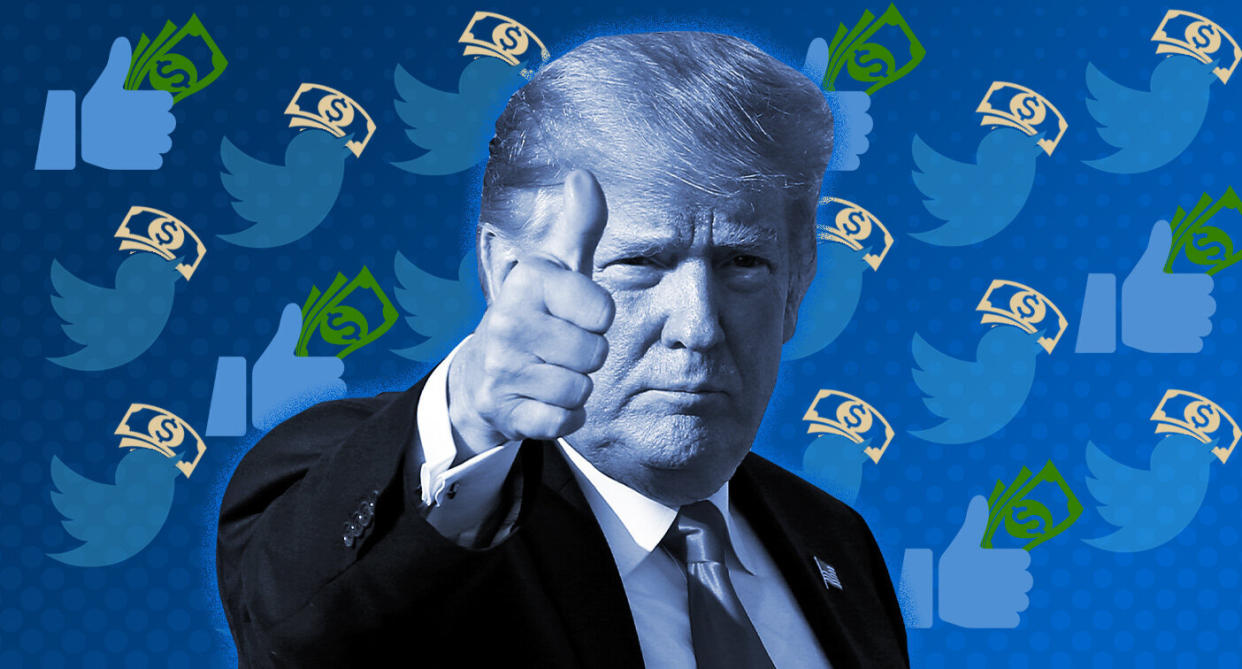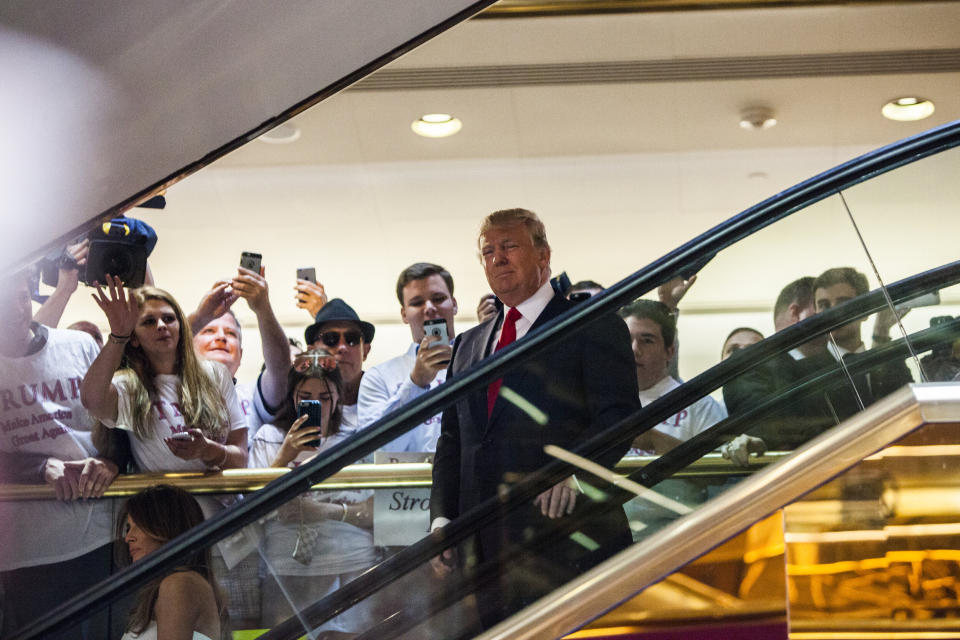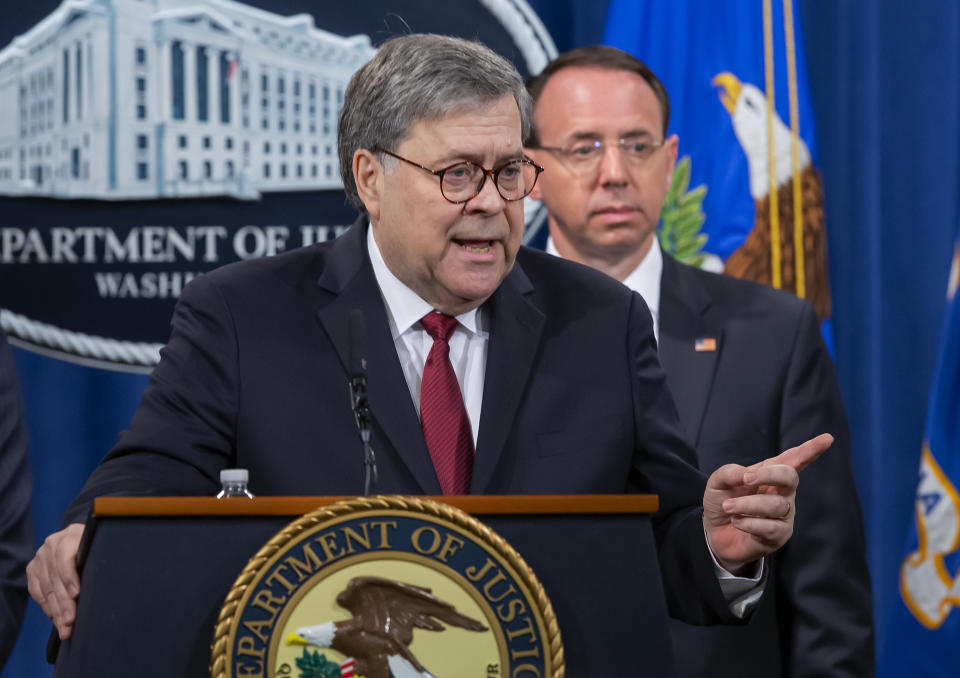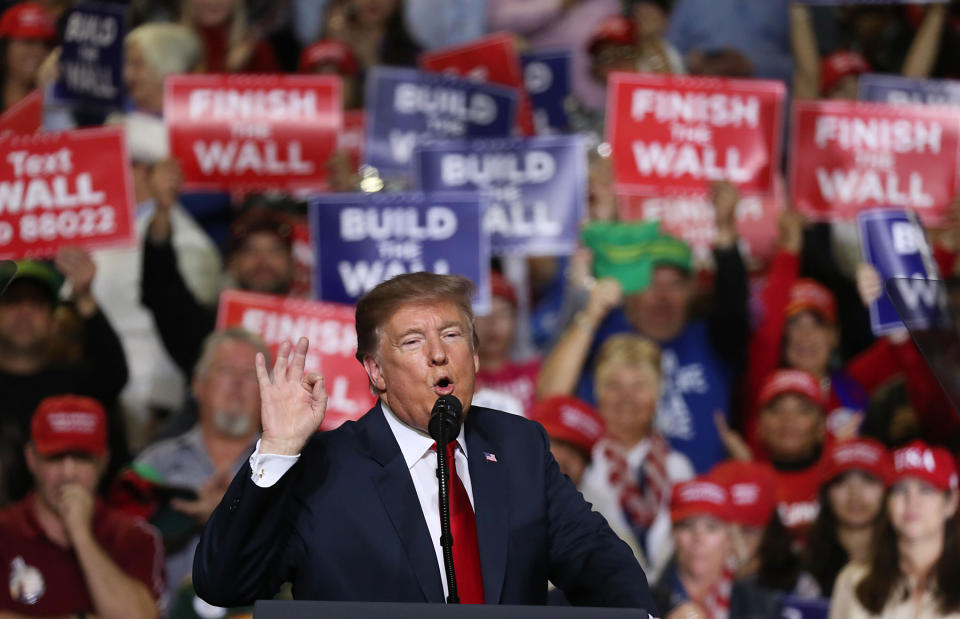A Facebook ‘army’ and freewheeling tweets: Inside the billion-dollar Trump 2020 campaign machine

ARLINGTON, Va. — Four years ago today, Donald Trump was poised to descend his golden escalator and begin a ride that would take him all the way to the Oval Office. As he prepared his campaign, Trump didn’t have much of a team. Even weeks before the launch, Trump’s braintrust was largely limited to four close associates who planned his White House bid from his Manhattan office. This time around, though, things are going to be very different.
In an office tower in Arlington, Va., just across the Potomac River from the White House, there are already about three dozen people working in the headquarters of Trump’s reelection campaign — and they’re ramping up. Trump’s is also backed by a super-PAC that is planning to pour hundreds of millions of dollars into key states.
Trump’s team is vowing to put together a more-than-$1 billion machine that will dwarf the guerilla operation he had early in the 2016 cycle. The president is also coming into the race with key structural advantages and experience running a powerfully influential Facebook advertising blitz.
Yet as the Trump reelection bid moves into high gear over the next few months, its staffers must balance trying to build a traditional campaign organization centered around an unconventional candidate. During a series of conversations with Yahoo News earlier this week, senior figures working on Trump’s reelection effort discussed their strategy, which included leaning into some of the most controversial aspects of his record, such as immigration, and yet also pursuing unexpected targets, such as Latinos.
The blueprint also involves making no attempts to constrain Trump, even when his Twitter tirades or off-the-cuff comments upend the campaign’s carefully made plans. In 2016, Trump won the White House as an outsider scoring a stunning upset. Now, he is the establishment and his team hopes they can combine a huge, professional infrastructure with a candidate they acknowledge is the ultimate “disruptor.” It’s a volatile mix that’s unprecedented in the political arena.
Trump’s team has already been growing for months. On Monday, five new senior staffers joined, including Kimberly Guilfoyle, a former Fox News host who is also dating one of the president’s sons. And in an early indication of the plan to fight for votes from Latinos and other minority groups, the announcement included the news that Hannah Castillo, who previously worked on Hispanic outreach efforts for the RNC and Virginia GOP, will serve as the campaign’s director of coalitions.

Along with a much larger operation than his last campaign, Trump is set to enjoy major structural advantages in this election. As president, Trump has the unrivaled megaphone and majestic trappings of the White House, as well as the ability to promote legislation and executive orders to underpin his agenda. And there are more than 20 Democrats vying to challenge Trump, setting the stage for a divisive primary that could leave his eventual opponent badly bruised.
While Trump and his team are clearly watching the Democrats who are running for president, they don’t seem too concerned with former Massachusetts Gov. Bill Weld, who launched a campaign as a Republican last month. A senior Trump campaign staffer dismissed the idea that Weld’s primary challenge poses a threat, pointing to Trump’s nearly ninety percent approval rating among Republicans. A Republican National Committee spokeswoman also cited Trump’s support among members of the party to shoot down the notion he could face a serious primary rival.
“The RNC and the Republican Party are firmly behind the president. Any effort to challenge the president’s nomination is bound to go absolutely nowhere,” the RNC spokeswoman said.
The lack of a major GOP opponent has helped Trump amass a sizable war chest. Last month, the Trump campaign announced it raised nearly $30 million during the first quarter of 2019, far outpacing any of the Democrats who hope to challenge the president next year.
Time is on Trump’s side too. With Weld showing little sign of momentum, Trump’s team can plot a national campaign while all his potential Democratic rivals have to focus on each other and key early primary states. Trump’s head start was boosted by his unusual decision to officially launch his reelection bid on the day he took office in 2017.
“The lights never went off. … The campaign never fully shut down,” Trump 2020 deputy communications director Erin Perrine told Yahoo News.

Of course, being president also comes with pitfalls. Trump’s time in office has proved divisive and, while Democrats may not be united behind a single 2020 candidate yet, the congressional opposition has been aggressively investigating and attacking Trump’s White House. But Trump’s campaign is confident he can run on his record. In fact, they’re not planning to shy away from the most controversial moments of his presidency — the investigation into Trump’s ties to Russia and his aggressive efforts to curb illegal immigration.
Tim Murtaugh, director of communications for the Trump campaign, brushed off the continued legal wrangling between investigators and Trump’s legal team over records related to the president’s real estate business as “a distraction.” The efforts by prosecutors and congressional Democrats to look into Trump’s company is part of the fallout from special counsel Robert Mueller’s investigation into Russian interference in the 2016 presidential race.
The Mueller report, released last month, outlined a Kremlin operation that aimed to help Trump and hurt the 2016 Democratic contender Hillary Clinton. Mueller also detailed extensive contacts between Trump’s inner circle and Russia, including business ties the president denied while he was campaigning. While Mueller’s investigation resulted in charges against several close Trump associates, he was unable to find sufficient evidence to prove Trump’s campaign participated in a conspiracy to aid the Russian meddling.
Mueller also described several instances in which Trump could have been viewed as having obstructed the probe. Attorney General William Barr, who was appointed by Trump, declined to charge the president with obstruction of justice based on Mueller’s findings. Congressional Democrats have raised concerns about Barr’s handling of the investigation and are attempting to gather further evidence.

Trump and his allies have described Mueller’s report as a complete exoneration of the president and have focused on the fact there was no evidence of cooperation between his campaign and Russia. Murtaugh echoed that line and added that he would “not be at all surprised” to see Trump bring up the report regularly on the 2020 campaign trail.
“You might hear a lot about the Russia hoax, the collusion hoax. The guy spent two years — two whole years — being called a Russian agent by the media and by … virtually every Democrat, whoever could find a television camera,” Murtaugh said of Trump.
Murtaugh suggested it would be natural for Trump to push back against an attack.
“He was being accused of being essentially a Russian spy as the president of the United States. It’s about the most outrageous thing that you could say about the president of the United States,” said Murtaugh, adding, “All of it was untrue, so a little righteous indignation is to be expected.”
The other major controversy of Trump’s political career has been his focus on illegal immigration. Critics have said Trump’s rhetoric is racist and argued his policies, particularly the separation of migrant children from their families at the border, are inhumane. But Murtaugh predicted immigration will be a positive point for the president even among Latinos, nearly two thirds of whom voted against Trump in 2016.
“Democrats think erroneously that they can win the argument with Hispanic voters in particular simply by saying ‘Trump and immigration,’ and they think that works. It has been our experience that it does not,” Murtaugh said. “If you’re talking to Hispanic voters as we do, if they are themselves a legal immigrant who came through the process in the right way or have legal immigrants in their family in generations close to themselves they know they followed the rules and they think other people should follow the rules too.”
Expanding his Latino support would provide a boost to Trump’s hopes for a second term, and there is evidence the community isn’t a monolithic bloc of opposition to the president. Trump received nearly 30 percent of the Latino vote in 2016 and more recent data has indicated he has retained the support of about 20 percent of the community. There is also data to suggest some Latinos are staunchly opposed to illegal immigration while a wide swath of the community doesn’t see the issue as a priority.
But Trump’s potential problems on immigration might go beyond opposition to his policies. There are questions about whether Trump has delivered on his signature campaign promise from 2016 — a massive wall on the southern border. At times, Trump suggested this physical manifestation of his opposition to illegal immigration could be over 1,000 miles long, thirty feet high, made from concrete, and paid for by Mexico. As president, Trump has modified his position and suggested a “fence” would be adequate. And with Mexico refusing to pay for the project and Democrats opposing the effort, Trump has only been able to build a fraction of the wall he promised. Even more troublesome for Trump’s record is data showing that illegal border crossings have surged under his presidency, reaching an eleven-year high.

Nevertheless, Murtaugh argued Trump’s supporters will be satisfied with his work on the border. "By the time the election rolls around, about 450 miles of border wall will have been completed and this is despite Democrats’ refusal to give the president a dime for it,” Murtaugh said. “Thanks to his declaration of a national emergency the wall is being built, and it’s in progress.”
Other issues the campaign plans to focus on include banking reform, Trump’s efforts to fight the opioid epidemic, and most critically, a strong economy. In April unemployment fell to the lowest level in nearly half a century.
Trump’s official campaign isn’t the only part of his 2020 machinery. He is also being supported by the America First Action super-PAC. While presidential candidates sometimes have multiple political committees vying for supremacy among their supporters, America First Action has a quasi-official status, and multiple key members of Trump’s inner circle are working with the PAC.
Last month, America First Action announced its chairman would be Linda McMahon, who had previously served in Trump’s cabinet as head of the Small Business Administration. Former White House Press Secretary Sean Spicer is a senior adviser to the PAC, and ex-West Wing aide Kelly Sadler is the group’s communications director. Kimberly Guilfoyle, the former Fox News host who is dating the president’s son and recently joined his campaign, previously worked at the PAC. A statement from the Trump campaign that announced Guilfoyle had joined the team described America First Action as “the preeminent Super-PAC supporting the President.”
Like the Trump campaign, America First Action believes immigration can be a winning issue for Trump with Latinos. A source familiar with the committee’s operations said the PAC plans to raise more than the $200 million the various outside groups supporting Hillary Clinton hauled in as she faced Trump in 2016. America First Action will focus its activities in six target states that are costly to compete in and viewed by the PAC as crucial to a Trump victory: Florida, Michigan, North Carolina, Ohio, Georgia and Pennsylvania. In particular, the source said Florida is seen by the PAC as a must-win state for Trump.
All of the states being targeted by the PAC are ones where Trump won in 2016. According to the source, the PAC is concentrated on identifying additional voters who could swing to Trump in those states. Specifically, the PAC’s efforts are aimed at winning over new Trump voters by homing in on African-Americans, Hispanics, and suburban mothers and improving the president’s margins among these groups.
“Under President Trump’s administration, he’s had the lowest unemployment in history for African-Americans and Hispanics. For women, it’s the lowest in 65 years. So, we feel we have a great story to tell here. We’re the hottest economy in the world,” Sadler, the PAC’s communications director, told Yahoo News.

To make this strategy work, America First Action plans to buy attack ads on social media and in targeted local television programs, newspapers and ethnic dailies. Sadler said the PAC largely plans to stay out of the Democratic primary and will ramp up its activities when the opposition has thinned out. Like the campaign, America First Action hopes Trump will benefit from Democratic infighting.
“We’re going to keep our powder dry and let the Democrats do the hatchet jobs for us,” Sadler said.
It’s abundantly clear Trump’s reelection effort is a completely different animal than the upstart crew that propelled his shocking victory in 2016. This more formalized, professionalized, and, frankly, massive iteration of the Trump campaign will still include some of the hallmarks of the president’s last run, including a hyper-focused Facebook advertising offensive and raucous rallies. The campaign also hopes that leaving the president free to tweet and speak his mind will help them hold on to the outsider appeal that was so crucial to Trump’s rise.
Microtargeted Facebook ads were widely seen as one of the key factors behind the president’s surprising 2016 victory. Trump’s presence on the social network dwarfed that of his Democratic rival, Hillary Clinton. Data from Facebook revealed Trump had about 5.9 million ads on the platform compared to approximately 66,000 for Clinton.

Early last year, Brad Parscale, who ran Trump’s digital operation during the first race, was tapped to lead the entire 2020 campaign. Parscale and Trump’s son in law, Jared Kushner, led the social media push that was an instrumental part of the president’s election. Parscale’s promotion is a sign of just how important the Facebook microtargeting remains for Trump’s campaign. It’s a point of pride for the team that some political insiders have “verbed” the campaign manager and referred to the maneuver of installing your digital chief at the top of your organization as “pulling a Parscale.”
Trump’s 2016 campaign featured Facebook staffers embedded in an office near where Parscale was set up. A senior Trump campaign staffer who spoke to Yahoo News said they weren’t sure whether anyone from Facebook is working at the headquarters. However, the campaign is clearly open to the idea and plans to have a large team crafting Facebook ads.
“If there’s a Facebook guy around here somewhere, I haven’t met them yet. ... That would be interesting,” the senior staffer said, adding, “We’re going to have a whole army of designers.”
The campaign was willing to discuss its emphasis on Facebook microtargeting, something of a known trademark for team Trump, but reticent to divulge plans for other social networks and more traditional advertising venues such as television.
Kushner, who is now a top White House adviser, will also remain close to the campaign. Multiple sources said Kushner is the campaign’s key liaison in the West Wing and has multiple daily conversations with Parscale. A Trump administration official said the pair have a “great working relationship” from 2016 and added, “Jared was the person who suggested to the president that Brad be in charge of the campaign.”
However, as he outlined the campaign manager’s role, Murtaugh, the communications director, made clear Parscale isn’t the ultimate authority on the team. “He gives direction, a vision. He gives goals,” Murtaugh said, adding, “Sometimes he says, ‘This is what the president wants.’ And that’s kind of non-negotiable.”
Indeed, the other major piece that is still clearly part of the president’s team is the “Let Trump Be Trump” ethos that was established by former 2016 campaign manager Corey Lewandowski. That meant not trying to curtail Trump as he veered off script at his marathon rallies or fired off blunt jabs on Twitter. Perrine, the campaign’s deputy communications director, said this philosophy will “absolutely” remain in place for 2020.
“The president has had an insurgent mentality, an outsider mentality the entire time he’s been in DC,” said Perrine, adding, “We fully anticipate that will be the same mentality in this campaign, even in a larger structure.”
“Letting Trump Be Trump” may lend the incumbent some rebellious sheen as he tries to recapture the magic behind his initial upset. However, giving the president free rein on the campaign trail can easily overshadow or topple more carefully laid plans. This risk was evident in the wake of former Vice President Joe Biden’s entry to the crowded Democratic primary.
On Tuesday, the morning after Biden’s kickoff rally, Perrine stressed that the campaign planned to avoid focusing on any individual Democrat in the race and instead would treat them as “one homogenous group.” As she explained it, this would allow the campaign to take advantage of Democratic infighting.

“They’re all going to have to pass a purity of thought and a purity of policy test,” Perrine explained, adding, “That means things like Medicare for All, that means things like Green New Deal, voting for felons, basic income, impeaching the president. I mean, you name it.”
In other words, as Perrine put it, tying the Democrats together means the larger field can be forced to answer for “egregious” liberal positions adopted by some of their colleagues. Along with providing a path to exploit infighting, framing the Democrats as a group allows the Trump campaign to avoid elevating any potential challenger.
But that effort to keep the Democrats as a pack was dealt a blow by Trump himself almost immediately after his team outlined the strategy. On Wednesday, the morning after his campaign talked with Yahoo News, Trump went on a Twitter tear and retweeted over 50 messages criticizing the firefighters’ union endorsement of Biden.
Even before Trump launched the offensive against the former vice president, his staffers seemed fully aware he would likely blast a tweet-sized hole in the plan to consolidate the opposition. Prior to the presidential tweetstorm, Perrine specifically acknowledged the need to “let Trump be Trump” when asked if the campaign might focus on Biden in response to his rising poll numbers.
“You know, he’s his best campaign manager, best surrogate, best communications director. So, we absolutely follow his lead,” Perrine said.
_____
Read more from Yahoo News:


